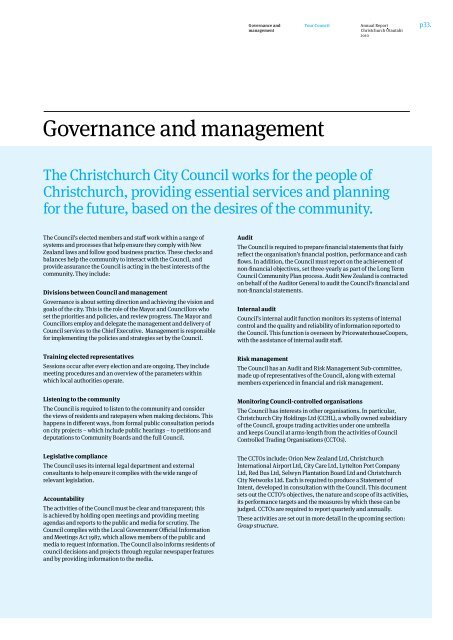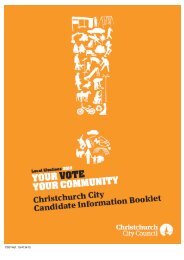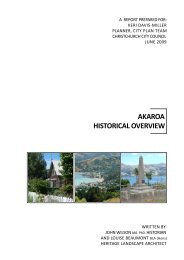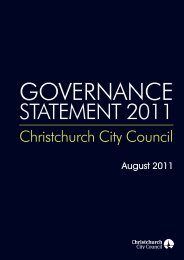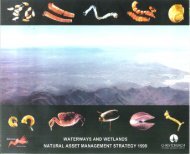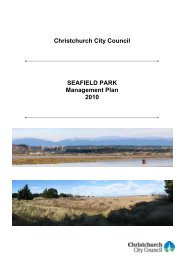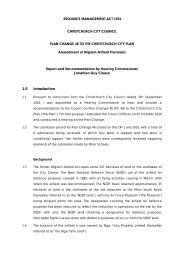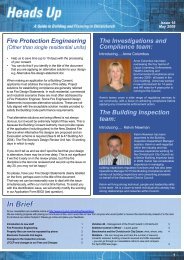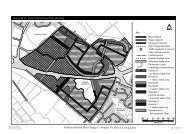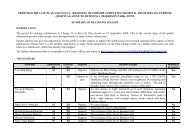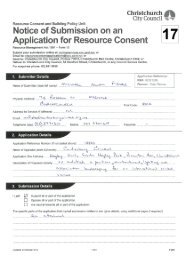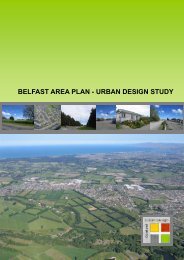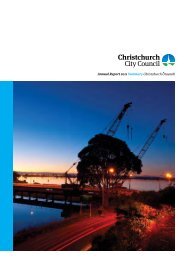Annual Report 2010 - Christchurch City Council
Annual Report 2010 - Christchurch City Council
Annual Report 2010 - Christchurch City Council
Create successful ePaper yourself
Turn your PDF publications into a flip-book with our unique Google optimized e-Paper software.
Governance and<br />
management<br />
Your <strong>Council</strong><br />
<strong>Annual</strong> <strong>Report</strong><br />
<strong>Christchurch</strong> Otautahi<br />
<strong>2010</strong><br />
p33.<br />
Governance and management<br />
The <strong>Christchurch</strong> <strong>City</strong> <strong>Council</strong> works for the people of<br />
<strong>Christchurch</strong>, providing essential services and planning<br />
for the future, based on the desires of the community.<br />
The <strong>Council</strong>’s elected members and staff work within a range of<br />
systems and processes that help ensure they comply with New<br />
Zealand laws and follow good business practice. These checks and<br />
balances help the community to interact with the <strong>Council</strong>, and<br />
provide assurance the <strong>Council</strong> is acting in the best interests of the<br />
community. They include:<br />
Divisions between <strong>Council</strong> and management<br />
Governance is about setting direction and achieving the vision and<br />
goals of the city. This is the role of the Mayor and <strong>Council</strong>lors who<br />
set the priorities and policies, and review progress. The Mayor and<br />
<strong>Council</strong>lors employ and delegate the management and delivery of<br />
<strong>Council</strong> services to the Chief Executive. Management is responsible<br />
for implementing the policies and strategies set by the <strong>Council</strong>.<br />
Training elected representatives<br />
Sessions occur after every election and are ongoing. They include<br />
meeting procedures and an overview of the parameters within<br />
which local authorities operate.<br />
Listening to the community<br />
The <strong>Council</strong> is required to listen to the community and consider<br />
the views of residents and ratepayers when making decisions. This<br />
happens in different ways, from formal public consultation periods<br />
on city projects – which include public hearings – to petitions and<br />
deputations to Community Boards and the full <strong>Council</strong>.<br />
Legislative compliance<br />
The <strong>Council</strong> uses its internal legal department and external<br />
consultants to help ensure it complies with the wide range of<br />
relevant legislation.<br />
Accountability<br />
The activities of the <strong>Council</strong> must be clear and transparent; this<br />
is achieved by holding open meetings and providing meeting<br />
agendas and reports to the public and media for scrutiny. The<br />
<strong>Council</strong> complies with the Local Government Official Information<br />
and Meetings Act 1987, which allows members of the public and<br />
media to request information. The <strong>Council</strong> also informs residents of<br />
council decisions and projects through regular newspaper features<br />
and by providing information to the media.<br />
Audit<br />
The <strong>Council</strong> is required to prepare financial statements that fairly<br />
reflect the organisation’s financial position, performance and cash<br />
flows. In addition, the <strong>Council</strong> must report on the achievement of<br />
non-financial objectives, set three-yearly as part of the Long Term<br />
<strong>Council</strong> Community Plan process. Audit New Zealand is contracted<br />
on behalf of the Auditor General to audit the <strong>Council</strong>’s financial and<br />
non-financial statements.<br />
Internal audit<br />
<strong>Council</strong>’s internal audit function monitors its systems of internal<br />
control and the quality and reliability of information reported to<br />
the <strong>Council</strong>. This function is overseen by PricewaterhouseCoopers,<br />
with the assistance of internal audit staff.<br />
Risk management<br />
The <strong>Council</strong> has an Audit and Risk Management Sub-committee,<br />
made up of representatives of the <strong>Council</strong>, along with external<br />
members experienced in financial and risk management.<br />
Monitoring <strong>Council</strong>-controlled organisations<br />
The <strong>Council</strong> has interests in other organisations. In particular,<br />
<strong>Christchurch</strong> <strong>City</strong> Holdings Ltd (CCHL), a wholly owned subsidiary<br />
of the <strong>Council</strong>, groups trading activities under one umbrella<br />
and keeps <strong>Council</strong> at arms-length from the activities of <strong>Council</strong><br />
Controlled Trading Organisations (CCTOs).<br />
The CCTOs include: Orion New Zealand Ltd, <strong>Christchurch</strong><br />
International Airport Ltd, <strong>City</strong> Care Ltd, Lyttelton Port Company<br />
Ltd, Red Bus Ltd, Selwyn Plantation Board Ltd and <strong>Christchurch</strong><br />
<strong>City</strong> Networks Ltd. Each is required to produce a Statement of<br />
Intent, developed in consultation with the <strong>Council</strong>. This document<br />
sets out the CCTO’s objectives, the nature and scope of its activities,<br />
its performance targets and the measures by which these can be<br />
judged. CCTOs are required to report quarterly and annually.<br />
These activities are set out in more detail in the upcoming section:<br />
Group structure.


